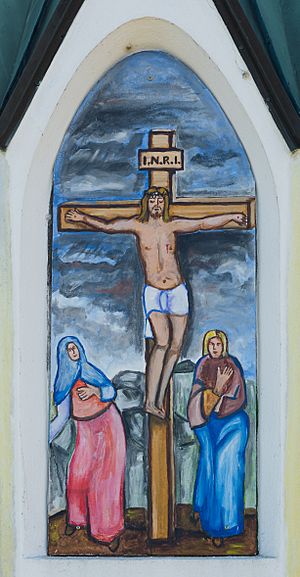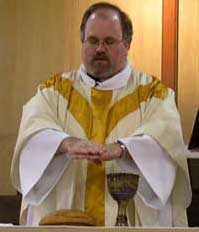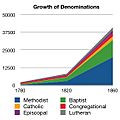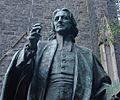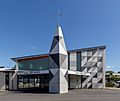Methodism facts for kids
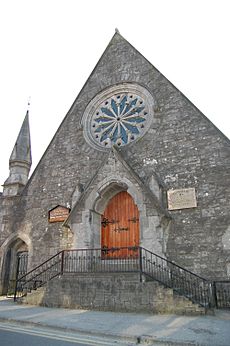
Methodism is a group of Protestant Christian churches. This movement began in Britain in the 18th century. It then spread to the United States and other parts of the British Empire. At first, it was very popular with workers, poor farmers, and enslaved people.
The person who started Methodism was Mr. John Wesley. He was a priest in the Church of England. His brother, Charles Wesley, was famous for writing church hymns.
Contents
What Methodists Believe (Theology)
All need to be saved.
All may be saved.
All may know themselves saved.
All may be saved to the uttermost.
Methodist churches do not have one single, strict statement of belief like some other Christian groups. However, many Methodist churches, such as the African Methodist Episcopal Church and the United Methodist Church, follow John Wesley's "Articles of Religion." These are a shorter version of the Church of England's beliefs, but without some ideas that John Wesley disagreed with.
Many Methodist groups also publish catechisms. These are books that briefly explain Christian beliefs. Methodists generally accept the Apostles' Creed and the Nicene Creed. These are old statements of faith shared by many Christians. Methodism also believes in the triune God: God the Father, God the Son (Jesus Christ), and God the Holy Spirit. They also believe that Jesus Christ was both fully human and fully divine.
Methodism focuses on sharing the Christian message and follows a theology called Wesleyan-Arminian. Methodists study John Wesley's ideas about church practices and beliefs. At its core, John Wesley's teaching emphasized living a holy Christian life. This means loving God with all your heart, mind, soul, and strength, and loving your neighbor as yourself. Many Methodist beliefs are also found in the hymns written by Charles Wesley. Singing these hymns together helped spread Wesleyan ideas in the early days of the movement.
How People Are Saved (Salvation)
Methodists believe in free will. This means people can choose to accept or reject God's offer of salvation, unlike the idea that everything is already decided (predestination). Methodism teaches that salvation begins when a person chooses to respond to God. God helps people come closer to Him (this is called prevenient grace). This means that both God and the person work together (called synergism).
Methodists believe the Bible teaches that Jesus Christ's saving work is for everyone (unlimited atonement). However, it only works for those who respond and believe. This follows the ideas of the Reformation: sola gratia (grace alone) and sola fide (faith alone). John Wesley taught four main points important to Methodism:
- A person is free to choose to accept or reject salvation.
- All people who follow the gospel with the understanding they have will be saved.
- The Holy Spirit directly assures a Christian that they are saved. This is an inner "experience" (assurance of salvation).
- Christians can become more like Christ (achieve Christian perfection) in this life, and God commands them to try.
After a person experiences the new birth, Methodists stress how important it is to seek holiness in their salvation. As Methodist evangelist Phoebe Palmer said, "justification would have ended with me had I refused to be holy." So, for Methodists, "true faith...cannot exist without good actions." Methodism teaches that being made right with God depends on being obedient and growing in holiness. This means relying deeply on Christ not just to start believing, but to keep believing. John Wesley taught that following the Ten Commandments and doing "works of piety" (like prayer and Bible study) and "works of mercy" (like helping others) were necessary for becoming holy.
Holy Practices (Sacraments)
Methodists believe that sacraments are sacred acts started by God. Methodism gets its church practices from Anglicanism.
Like most Protestants, Methodists recognize two sacraments that Jesus Christ started: Baptism and Holy Communion (also called the "Lord's Supper"). Most Methodist churches baptize babies, expecting them to confirm their faith later. They also practice believer's baptism for those who choose it. The Catechism for the use of the people called Methodists says that in Holy Communion, "Jesus Christ is present with his worshipping people and gives himself to them as their Lord and Saviour." How Christ is present in the bread and wine is a "Holy Mystery."
Methodist churches generally see sacraments as a way God gives grace. John Wesley believed God also gave grace through other regular practices. These include public and private prayer, reading the Bible, studying the Bible, preaching, public worship, and fasting. These are called the Works of Piety. Wesley saw these as "outward signs, words, or actions... to be the ordinary channels whereby [God] might convey to men, preventing [preparing], justifying or sanctifying grace." Special Methodist practices, like class meetings, were important examples of these ways to receive grace.
Traditionally, Methodists believe the Bible (Old and New Testaments) is the only book inspired by God. It is the main source of authority for Christians. Methodists also use tradition, especially the teachings of the Church Fathers, as a source of authority. While tradition is not perfect like the Bible, it helps understand the Bible. Methodist discussions about faith almost always use the Bible, read within the larger history of Christian beliefs.
It has always been a belief in the church that careful study of faith requires using reason. Through reason, people can read and understand the Bible clearly and consistently. Through reason, they can ask questions about faith and try to understand God's actions and will. Methodism insists that personal salvation always means Christian mission and serving the world. Being holy means more than just personal devotion; loving God is always connected to loving your neighbors and working for fairness and renewal in the world.
Worship and Church Services
The Wesley brothers gave Methodism a way of worship that combined two things: the formal services from the Book of Common Prayer and informal preaching services.
This combination became special to Methodism. In the Church of England, worship was only based on the Book of Common Prayer. In Non-conformist churches, worship was mostly "services of the word" (preaching), with Holy Communion happening rarely. John Wesley made sure that in Methodism, these two practices were put together, and this is still a key part of the movement. The Lovefeast, usually held every three months, was another practice that was important in early Methodism, as John Wesley taught it was a practice from the early apostles.
In America, the United Methodist Church and Free Methodist Church, along with the Primitive Methodist Church and Wesleyan Methodist Church, have many different ways of worship. These range from very formal to very simple. When Methodists in America separated from the Church of England after the American Revolution, John Wesley himself provided a changed version of the Book of Common Prayer. It was called The Sunday Service of the Methodists; With Other Occasional Services (1784). Today, the main books for services in the United Methodist Church are The United Methodist Hymnal and The United Methodist Book of Worship. Churches can choose to use these services and rituals, but they don't have to. These books contain church services that come from Wesley's Sunday Service and from a movement in the 20th century to renew church services.
The British Methodist Church is less formal in its worship. However, it uses the Methodist Worship Book (similar to the Church of England's Common Worship). This book contains services and rules for other rites, like marriage. The Worship Book also comes from Wesley's Sunday Service.
A unique part of American Methodism has been the special time of Kingdomtide. This covers the last 13 weeks before Advent. It divides the long period after Pentecost into two parts. During Kingdomtide, Methodist services have traditionally focused on helping others and easing the suffering of the poor.
Another special part of Methodist services is the use of Covenant Services. While practices differ between countries, most Methodist churches annually follow John Wesley's call to renew their promise (covenant) with God. In British Methodism, it's common for each church to hold an annual Covenant Service on the first convenient Sunday of the year. Wesley's Covenant Prayer is still used, with small changes, in the service:
Christ has many services to be done. Some are easy, others are difficult. Some bring honour, others bring reproach. Some are suitable to our natural inclinations and temporal interests, others are contrary to both ... Yet the power to do all these things is given to us in Christ, who strengthens us.
...I am no longer my own but yours. Put me to what you will, rank me with whom you will; put me to doing, put me to suffering; let me be employed for you or laid aside for you, exalted for you or brought low for you; let me be full, let me be empty, let me have all things, let me have nothing; I freely and wholeheartedly yield all things to your pleasure and disposal.
John Wesley encouraged sharing the Christian message outdoors. Because of this, revival services are a traditional Methodist worship practice. These are often held in churches, as well as at camp meetings and tent revivals.
Related pages
Images for kids
-
The first Methodist chapel, "The Foundery", London.
-
Communion table behind the rail in Wesley's Chapel, London. The reredos depicts the Ten Commandments.
-
Methodist preachers were known for teaching about the new birth and entire sanctification at events like tent revivals and camp meetings (shown here in an old picture).
-
Wesley's Chapel in London was started by John Wesley, whose statue stands in the courtyard.
-
The Methodist chapel in Rome has churches for both Italian and English speakers.
-
Methodist chapel at the foot of the Achalm mountain, Baden-Württemberg
-
Flower Lane Church is the first Methodist church built in downtown Fuzhou.
-
Former Methodist school in Wuhan (started 1885)
-
The CSI English Wesley Church in Chennai is one of the oldest Methodist chapels in India.
-
The first Presiding Bishop of Ang Iglesia Metodista sa Pilipinas being made a bishop at Luacan Church in Bataan, Philippines
-
A Methodist church in Apizaco, Tlaxcala
-
Barratt's Chapel, built in 1780, is the oldest Methodist church in the United States built for that purpose. It was a meeting place for Asbury and Coke.
-
Grace Wesleyan Methodist Church is a church of the Allegheny Wesleyan Methodist Connection, one of the largest groups in the conservative holiness movement, and is located in Akron, Ohio.
-
Started as a Methodist church, Glide Memorial Church has been a gathering place for counter-culture groups and is known as a liberal church.
-
Statue of John Wesley outside Wesley Church in Melbourne
-
Chinese Methodist Church, Christchurch
-
Saione, the church of the king – the main Free Wesleyan Church of Kolomotuʻa, Tonga
See also
 In Spanish: Metodismo para niños
In Spanish: Metodismo para niños
 | Victor J. Glover |
 | Yvonne Cagle |
 | Jeanette Epps |
 | Bernard A. Harris Jr. |


